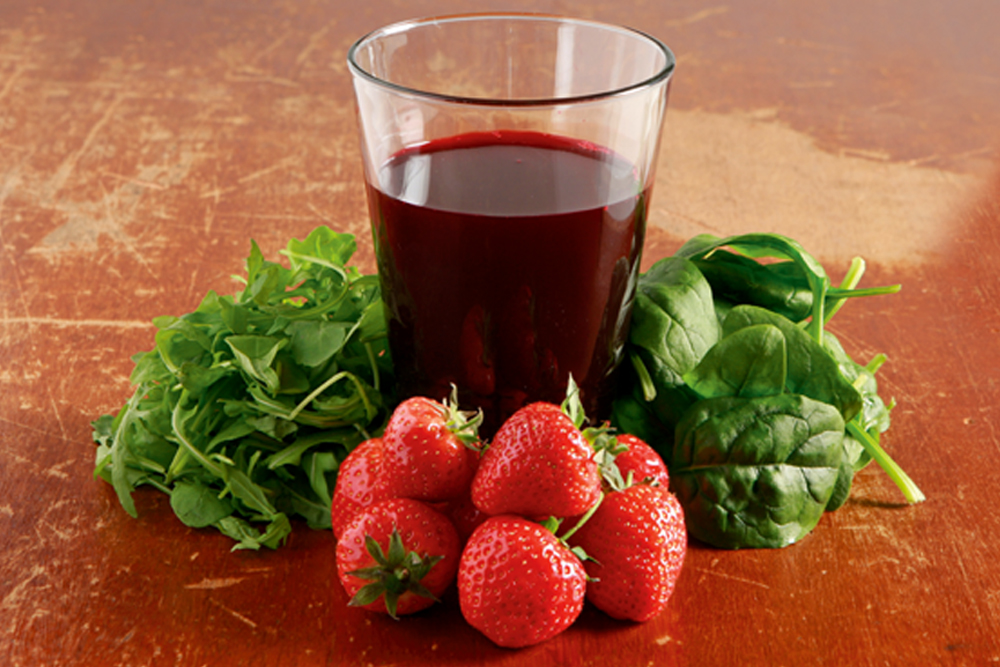How to use nitrate to boost cycling performance
Getting the most from nature’s most potent performance-enhancer

Since research discovered beetroot juice could significantly improve aerobic performance, more and more cyclists have begun looking seriously at the red root vegetable as a means of getting an edge over their rivals. So, does it really work?
>>> Tinkoff-Saxo chef Hannah Grant explains what it takes to fuel a pro rider
The first thing to note is that it is the nitrate found within beetroot that may improve performance, not any other component of the vegetable. The majority of studies on nitrate have used beetroot juice, but beetroot isn’t the only food that contains nitrate; others include spinach, rocket and lettuce.
Beetroot juice is the substance most commonly used because it is far easier to extract, measure and administer to subjects.
Eat natural foods for the best cycling performance
When nitrate is ingested, it is immediately converted into nitrite. When nitrite encounters body tissue with lower oxygen levels, such as exercising muscles, it is converted to nitric oxide.
>>> How gut health affects cycling performance
The latest race content, interviews, features, reviews and expert buying guides, direct to your inbox!
Nitric oxide effects a number of positive physiological changes in the body: it causes blood vessels to dilate, directing more blood and oxygen to the areas that need it most. Nitric oxide also has positive effects on muscle cells by improving their ability to contract and produce more energy.
>>> Five foods you should NEVER eat before a ride (video)
A number of nutrition companies now sell products containing nitrate. Beet It has been at the forefront of developing nitrate-enriched beetroot juice and others such as Zipvit now manufacture similar products.
The essentials
- Beetroot juice isn’t the only source of nitrate
- Nitrate can improve cycling performance
- Drinking too much beetroot juice can turn your urine red
- 5-8mmol of nitrate to be consumed two to three hours before cycling
- Nitrate has minimal side effects
- Nitrite are a conversion of nitrates
Optimising dosage
In 2012, a Dutch study subjected 12 trained cyclists to a series of cycling trials. In the six days leading up to each trial, they consumed just 140ml of concentrated beetroot juice, and saw marked improvements in average power output, rising from 288w in the placebo trial to 294w in the active beetroot trial.
>>> Recover right with these four post-cycling meals (video)
The latest research supports the hypothesis that the biggest improvements in performance are seen when 5-8mmol of nitrate is consumed two to three hours before exercise. However, it’s important to note that this figure can vary between individuals, and factors such as body size influence the optimum dosage size.
What you should - and shouldn't - do after every ride
Key points
Nitrate is found in a number of foods, not just beetroot. Spinach, rocket, lettuce and strawberries, to name a few, all contain nitrate and will help improve performance in the same way. These are healthy foods to add to your diet and should be consumed on a regular basis.
>>> Tips for cycling and training in the dark
Initial research concluded that an athlete must consume almost 500ml of beetroot juice daily for six weeks to see improvements in performance. This has been discredited, and it is now accepted that the biggest improvements in performance are seen when 5-8mmol of nitrate is consumed two to three hours before exercise.
Remember, nitrate content varies massively between foods. Factors such as soil and light conditions, and general quality of the produce, will affect nitrate levels.
>>> Prevent muscle pain with good cycling nutrition
Nutrition companies such as Beet It and Zipvit produce concentrated nitrate sources, enabling riders to consume measured doses in a smaller quantity. This eliminates the risk of consuming food sources that may have little nitrates in them.
The principal effect of nitrate supplementation is to lower the oxygen cost of exercise, making muscles more efficient.
High levels of nitrite can be toxic. Inadequate storage and reheating of nitrate-rich foods, such as spinach, can lead to conversion of the nitrate to elevated, toxic levels of nitrite.
Jack Elton-Walters hails from the Isle of Wight, and would be quick to tell anyone that it's his favourite place to ride. He has covered a varied range of topics for Cycling Weekly, producing articles focusing on tech, professional racing and cycling culture. He moved on to work for Cyclist Magazine in 2017 where he stayed for four years until going freelance. He now returns to Cycling Weekly from time-to-time to cover racing, review cycling gear and write longer features for print and online.